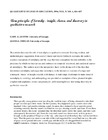| dc.contributor.creator | Deegan, James G. | |
| dc.contributor.creator | Fine, Gary Alan | |
| dc.date.accessioned | 2010-05-04T15:19:55Z | |
| dc.date.available | 2010-05-04T15:19:55Z | |
| dc.date.issued | 1996 | |
| dc.identifier.citation | Fine, G.A. and Deegan, J.(1996). 'Three Principles of Serendip: insight, Chance and Discovery in qualitative research.' International Journal of Qualitative Studies in Education, 9 (4), pp.434-447. | en |
| dc.identifier.uri | http://hdl.handle.net/10395/331 | |
| dc.description.abstract | This article discusses the role of serendipity in qualitative research. Drawing on ideas and methodological suggestions from a set of classic and recent fieldwork accounts, the authors examine conceptions of serendipity and the ways that these conceptions become embedded in the processes by which we incorporate and embrace the temporal, relational, and analytical aspects of serendipity. The authors reject the perspective that it is the divine roll of the dice that determines serendipity and argue that serendipity is the interactive outcome of unique and contingent "mixes" of insight coupled with chance. A wide range of attempts to make sense of serendipity in sociology and anthropology are provided as exemplars of how planned insights coupled with unplanned events can potentially yield meaningful and interesting discovery in qualitative research. | en |
| dc.publisher | Qualitative Studies in Education: Taylor & Francis | en |
| dc.relation.ispartofseries | Qualitative Studies in Education;9 (4) | |
| dc.subject | MIC | en |
| dc.title | Three principles of Serendip : insight, chance, and discovery in qualitative research | en |
| dc.type | Article | en |
| dc.type.supercollection | all_mic_research | en |
| dc.type.supercollection | mic_published_reviewed | en |
| dc.type.restriction | none | en |
| dc.description.version | Yes | en |


